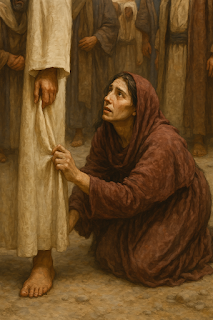
Discover “This Week With Jesus” — your sanctuary for daily inspiration, revival, and unwavering faith. Dive into reflections that renew the soul, ignite hope, and reveal the transformative power of God in everyday life. 💜 Stand with us in compassion. We proudly support Cancer Companions, who walk beside those affected by cancer with faith, love, and restorative care. Click on the sidebar to join the mission!
Tuesday, September 30, 2025
Break Through The Roof
Tuesday, September 23, 2025
Thursday, September 11, 2025
Thursday, September 4, 2025
The Judas Within
The two major villains of Christianity are Lucifer and Judas. We imagine their sin and shudder, never imagining we could act like them.
But, within each of us, a
complex and often contradictory landscape of loyalties and betrayals does
exist. This internal conflict is what we might call "the Judas in
you." This isn't about committing a grand, historical betrayal, but rather
about the subtle, everyday moments where we turn against our own values, our
truest selves, or those we claim to love. It's the part of us that whispers for
the easy way out, even if it means compromising our integrity. A part that
indulges in hate, criticism, gossip, slander, lies, compromising integrity at
work or at home, backbiting, and the list goes on. The Judas in us manifests in
various ways. It's the voice that convinces us to stay silent when we should
speak up for what is right, prioritizing our comfort over justice. It's the
impulse to gossip about a friend to feel more included, betraying their trust
for a fleeting sense of belonging. It's the temptation to take credit for
someone else's idea at work to get ahead, sacrificing honesty for ambition.
Have you ever been happy when something bad happened to a person that you
didn't like? "They got what they deserved. " This is not love. This is EVIL. This, is betrayal.
These small betrayals, though
they may seem insignificant, are the training ground for larger ones. They
erode our self-respect and create a dissonance between who we are and who we
pretend to be.
Acknowledging the Judas within
is not an act of self-condemnation but one of profound self-awareness. It
requires us to look honestly at our motives and understand the fear,
insecurity, or greed that drives us to act against our better judgment. It is only
by recognizing this shadow side that we can begin to wrestle with it. We can
choose to resist the temptation to betray ourselves and others, instead opting
for the harder but more rewarding path of integrity. This internal struggle is
a defining part of the human experience, and our ability to overcome the Judas
in us is a measure of our true character.
Thursday, August 14, 2025
Tuesday, August 5, 2025
The Legacy of Tabitha
Wednesday, July 30, 2025
Thursday, July 10, 2025
Silent Battles
Sunday, July 6, 2025
The Touch
Monday, June 30, 2025
Fear, Uncertainty & Doubt
Thursday, June 26, 2025
Stand Up For Jesus!
Thursday, November 21, 2024
God's leadership Team
Wednesday, November 13, 2024
Friday, September 13, 2024
A Piece of Bread
Thursday, September 12, 2024
The Shepherd's Song
In a small, quiet village nestled among rolling hills, lived a young shepherd named Elias. His days were filled with the gentle rhythm of tending his flock, the warmth of the sun on his face, and the comforting sound of sheep bells. Yet, beneath his simple life, Elias carried a deep longing for something more.
Wednesday, September 11, 2024
Monday, September 2, 2024
Standing on Promises
There is a Hymn called Standing on the promises of God. Nice hymn though it leaves some questions which is how do you do that? What does it mean?
Friday, August 30, 2024
Lessons From the Ark
1. Don't miss the boat.
2. Remember that we are all in the same boat.
3. Plan ahead. It wasn't raining when Noah built the Ark.
5. Don't listen to critics; just get on with the job that needs to be done.
6. Build your future on high ground.
7. For safety's sake, travel in pairs.
8. Speed isn't always an advantage. The snails were on board with the cheetahs.
9. When you're stressed, float awhile.
10. Remember, the Ark was built by amateurs, the Titanic by professionals.
11. No matter the storm, when you are with God, there's always a rainbow waiting.
- Author Unknown
Thursday, August 29, 2024
Do You Know the Voice?
This Week
Have You seen Jesus?
Have you ever thought about why were shepherds chosen to be the first to hear the good news? In the context of first-century Judea, choosin...













